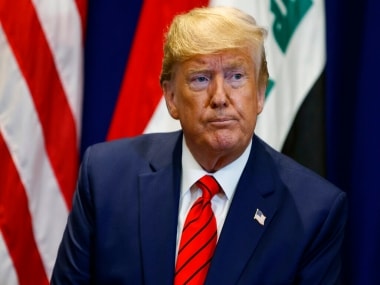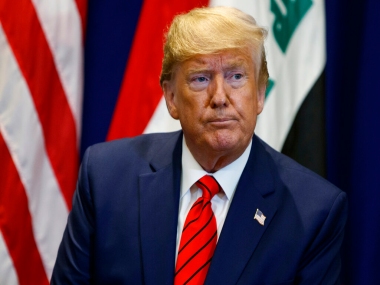Washington: The House Intelligence Committee released a 300-page impeachment report Tuesday accusing President Donald Trump of trying to enlist Ukraine to help him in the 2020 presidential election and obstructing the congressional inquiry by trying to cover it up. The committee released the report on the eve of a public hearing in the House Judiciary Committee as the panel begins considering whether to draft articles of impeachment that could lead to a Senate trial and Trump’s removal from office. Here are five takeaways from the report. The president leveraged Ukraine’s military aid and a White House meeting for political investigations. The “Trump-Ukraine Impeachment Inquiry Report” was a sweeping indictment of Trump’s behaviour, concluding that the president orchestrated a “scheme” to pressure Ukraine to announce investigations into former Vice President Joe Biden and other Democrats, while withholding nearly $400 million in military assistance and a White House meeting.[caption id=“attachment_7397481” align=“alignleft” width=“380”]  (File image) US president Donald Trump. AP[/caption] The report, written in narrative form, laid out the testimony of witnesses who came before the panel in public and private. It asserts that the president’s actions “subverted US foreign policy toward Ukraine and undermined our national security in favour of two politically motivated investigations that would help his presidential reelection campaign.” Trump ‘ordered and implemented’ a campaign to conceal his conduct from the public and Congress. The report accuses Trump of what it calls an “unprecedented campaign of obstruction of this impeachment inquiry,” saying he denied documents to Congress and tried to block State Department diplomats and White House officials from testifying. The president’s categorical refusal to cooperate with the investigation or comply with demands for documents violated the law, the report said. It accused the president of engaging in “a brazen effort to publicly attack and intimidate” witnesses. “The damage to our system of checks and balances, and to the balance of power within our three branches of government, will be long-lasting and potentially irrevocable if the president’s ability to stonewall Congress goes unchecked,” the report concluded. The report is a road map to the president’s possible impeachment and removal from office. The report stopped short of explicitly calling for the president’s impeachment and removal from office. But Republican Adam B Schiff, D-Calif., and the chairman of the Intelligence Committee, made it clear he viewed the document as a road map to impeachment for the House. “The Founding Fathers prescribed a remedy for a chief executive who places his personal interests above those of the country: impeachment,” the report said. Schiff, in a preface to the report, warned that the clash between the two parties about Trump’s actions reflects the kind of factionalism that the country’s founders believed would be dangerous to the republic. “Today, we may be witnessing a collision between the power of a remedy meant to curb presidential misconduct and the power of faction determined to defend against the use of that remedy on a president of the same party,” Schiff wrote. New evidence emerges of calls between Rudy Giuliani and others about a smear campaign on an ambassador. The report largely recounts information already made public during testimony from administration officials. But it also indicated that Democrats have collected more raw evidence than previously known, including call records produced by AT&T and Verizon showing a series of phone calls between Trump’s personal lawyer Rudy Giuliani and his associates and several government officials. The calls came as Giuliani was executing a smear campaign against the US ambassador to Ukraine at the time, Marie L Yovanovitch, and pressing Ukraine to begin investigations that would benefit Trump. The records show calls between Giuliani and others, including Republican Devin Nunes of California, the top Republican on the Intelligence Committee. Speaking with reporters Tuesday, Schiff said that the call records showed “considerable coordination among the parties, including the White House — coordination in the smear campaign against Ambassador Yovanovitch.” Schiff declined to say whether he believed Nunes should recuse himself from the remainder of the inquiry, but suggested the records were not flattering. “It is deeply concerning that at a time that the president of the United States was using the power of his office to dig up dirt on a political rival that there may be evidence that there were members of Congress complicit in that activity,” he said. Report prompts new phase in impeachment inquiry as Judiciary Committee considers articles of impeachment. The release of the report largely concludes the investigation by the Intelligence Committee and moves the impeachment inquiry into a new phase led by the House Judiciary Committee, which plans to hold its first hearing Wednesday. That hearing will include four legal scholars for a discussion about the constitutional standards for impeachment. Republican Jerrold Nadler, D-N.Y., the chairman of the Judiciary Committee, has said the hearing will also focus on whether Trump’s behaviour rises to the level of those standards. A second hearing is expected to provide a forum for Intelligence Committee lawyers to formally present their report to the Judiciary Committee members. And a third hearing could offer Trump or his lawyers the opportunity to defend himself, though the White House counsel has so far indicated that he is unlikely to take part in what they deem an unfair process. If a majority of the House voted to approve articles of impeachment, which would be drafted by the Judiciary Committee, the president would be impeached. The proceedings would move to the Senate for a trial. Two-thirds of senators would have to vote to convict Trump to end his presidency. Michael D Shear c.2019 The New York Times Company
The report, written in narrative form, laid out the testimony of witnesses who came before the panel in public and private.
Advertisement
End of Article


)

)
)
)
)
)
)
)
)



